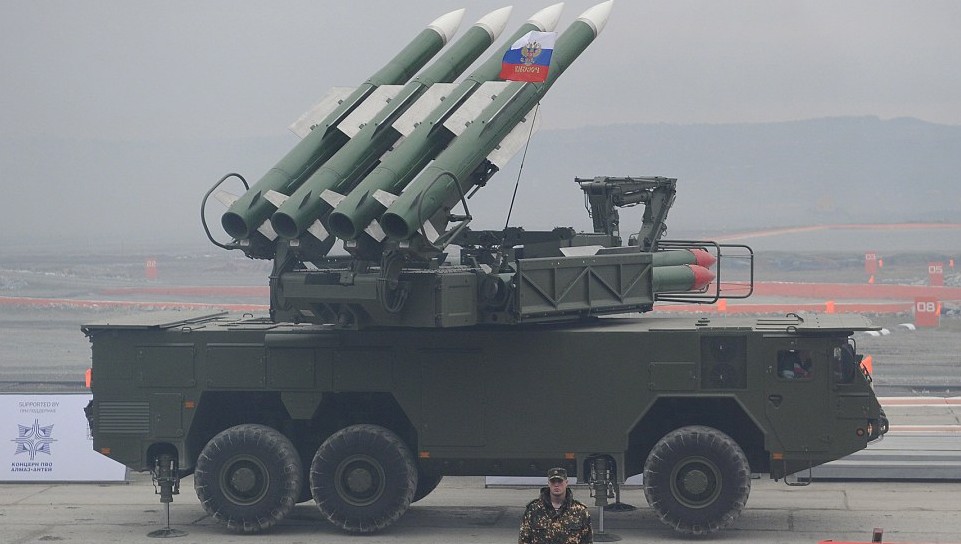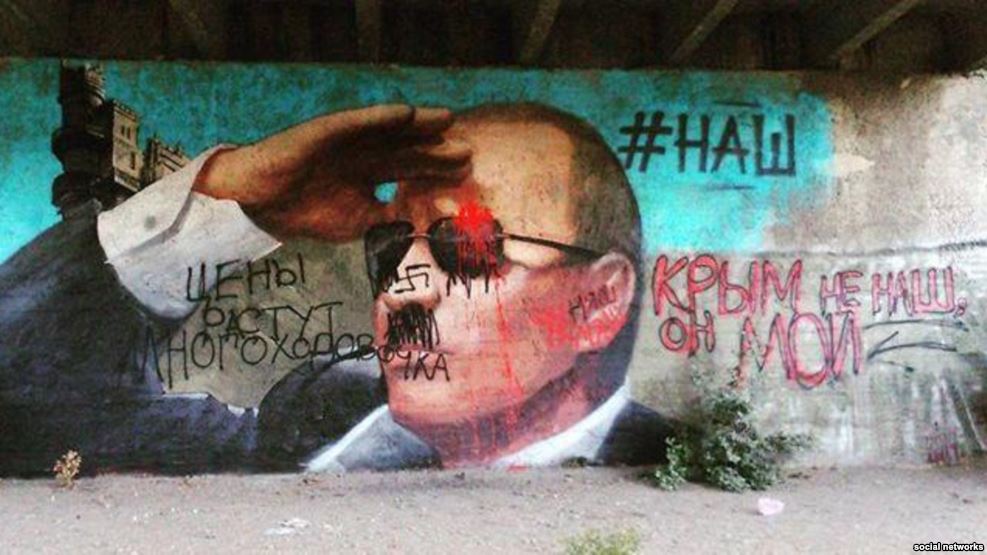When the commander of battalion Azov, Andrii Biletskyi, commented recently on the reluctance of Ukrainian bureaucrats to fight an open military war against Russia, I knew I had found an example of what psychologists call “betrayal trauma.” Betrayal trauma is defined by cognitive psychologist and trauma theorist, Dr. Jennifer Freyd as occurring “when the people or institutions we depend on for survival violate us in some way. Betrayal trauma produces conflict between external reality and a necessary system of social dependence.”
Commander Biletskyi’s comments on Facebook were as follows: “The current elites belong to the elites of the past years (of Ukrainian independence) who have created a relationship of semi-satellite status vis-a-vis Russia. It is nearly impossible for them to bring themselves to fight a serious war against their master. But another elite is coming, because a new Ukraine is coming!... Authentic leaders of a strong Ukrainian nation are currently being forged on the battlefield....”
Betrayal trauma in individual lives is a very serious matter, explaining why a person would downplay the violence of sexual abuse by a family member and its impact on their mental health later in life. Ukraine’s frozen reaction to the invasion by Russia and having the world stand by and watch the annexation and military aggression fits the dynamics of betrayal trauma at the level of group experience. The year-long war in Ukraine, preceded by years of covert subversion, has likewise been very grave, and as Biletskyi writes, it has meant that Ukrainian bureaucrats and politicians face a real crisis “to bring themselves to fight a serious war against their master.”
For the past year there have been various debates regarding if and to what extent Ukraine is socially dependent on Russia. “The more profound the betrayal and the more vital to survival the betrayer is, the more likely it is that the trauma will be denied, dissociated, or diminished by both the victim and the bystander,” writes Mary Gail Frawley-O’Dea in “When Mourning Never Comes: What Happens When Individuals, Institutions, or Nations Fail to Mourn After Trauma?” The United States, The United Nations and other institutions would qualify as bystanders in this case, all those “who consciously or unconsciously insist on maintaining an attachment to the victimizer on whom they depend for some aspect of survival.”
Frawley-O’Dea bases her work on mourning and grieving, healing and liberation, on that of Vamik Volkan, and for both of them “mourning is essential if the unbearable is to be borne, healed, and transformed into something meaningful.” She describes Volkan’s contribution in this manner: “Vamik Volkan is a psychoanalytic psychiatrist and founder of the International Society of Political Psychology, an interdisciplinary group representing psychology, psychiatry, political science, sociology, history, and anthropology. Killing in the Name of Identity (Volkan, 2006), addresses, among other concepts, the national and international consequences that ensue when members of large identity groups fail to mourn.”
It has taken since the 1991 collapse of the Soviet Union for these issues of betrayal and mourning and idealizing a past that never really existed to be finally addressed, and at a terrible price. “Volkan says that when an injury subjectively experienced as betrayal is levied on a large group, members of the group are destabilized and their sense of security is threatened,” writes Frawley-O’Dea.
It is hard to imagine, however, how it could be that such complicated grieving on the part of Russia after the collapse of the Soviet Union could be accepted by the world as justification for a war of aggression against Ukraine. However, the clichéd responses to the annexation of Crimea prove that the lies were believed. In Frawly-O’Dea’s assessment, “Failure to mourn... evokes defenses like denial, demands for restoration of that which never fully was, or submission to a nostalgia that maintains attachment to the lost and now idealized object.”
Vamik Volkan’s example is that of modern Greece, emerging from losses earlier to the Ottoman Empire. In “What Some Monuments Tell Us About Mourning and Forgiveness,” he writes the following: “For example, since the birth of modern Greece in the 1830s, after the Greek struggle for independence and separation from the Ottoman Empire, the Greeks had an ideology called the “Megali Idea,” which was a response to Greeks’ experience of many “losses” while they were Ottoman subjects.
“Megali Idea refers to regaining all of the lands that Greeks considered “lost” to others. This ideology was accompanied by a shared sense of “entitlement” to reverse helplessness and humiliation, turn passivity to assertion, and regain “lost” objects. Many authors (see Herzfeld, 1986; Koliopoulos, 1990; Markides, 1977; Volkan and Itzkowitz, 1994), have written about how the Megali Idea played a significant role in Greeks’ political, social, and especially religious lives since the Greek Orthodox Church was especially active in keeping the Megali Idea alive and active. Since Greece’s membership in the European Union, its investment in this ideology has been waning.”
The most recent Greek elections and the involvement of the Russian propagandists in Greek politics might signal a resurgence in this ideology based on a common failure to mourn and nostalgia for an idealized (non-existent) past glory. The Russian Orthodox Church has for its part has identified far more closely with Russian political ambitions than one would consider healthy given the principle of separation of Church and State in the phrase, "give unto Caesar what is Caesar's, and give unto God what is God's."
Volkan provides an explanation for Russian aggression, though an explanation is not a justification. He also gives an insight into Ukraine’s group vulnerability. First, information emerged about the undermining of Ukrainian political life by Russia after the Orange Revolution of 2004 in Ukraine, part of the Ukraine’s experience of betrayal. Second, other revelations followed, such as the actions of traitors within the Ukrainian army who would order troops to go in a certain direction and then inform the terrorists, who would execute ambushes against these soldiers.
The dynamic of betrayal and the uncertainty of one’s relationship with those who harm us is such that “we may maintain idealization of them and take on the blame for loss ourselves.... In this case, we dissociate, deny, or minimize betrayal in order to continue to belong,” Volkan explains. “I have seen this repudiation of mourning often in incest survivors who blame themselves for the violations of their younger bodies, minds, and spirits in order to maintain membership in their families.”
Ukrainian patriots closely involved with the volunteer Ukrainian fighting forces are very worried that the present mystery surrounding Putin’s health will mean darker days and more fierce fighting before the situation improves. Putin, who symbolically, perhaps, has not been seen in public since March 5, also the anniversary of Stalin’s death in 1953, represents what Volkan refers to as a “manic nostalgia", defined as “a longing for the past without the acceptance that it is over.” And there are no signs that without Putin the Kremlin will soon re-evaluate their own sense of the past and reach such conclusions as the need for the immediate withdrawal of troops from Ukraine and granting immediate freedom to Nadiya Savchenko.
Andrii Denysenko, now an elected member of the Verkhovna Rada, and earlier involved in the establishment of the Right Sector military and political organization, has described these fears in relation to the Putin’s recent and mysterious silence:
“First there was the Boeing aircraft, and now the murder of Nemtsov. Putin has been struck by his own boomerang. This is a boomerang of lies and murders; he is an injured serpent that has gnawed away at his own tail.
“Don’t think that he has died, even if he isn’t now the liveliest among the living. This is a wounded beast, a Leviathan that has forgotten nothing of the past and that has learned nothing from experience. He has become sequestered in order to lick his wounds. However, he will stop at nothing: not only has he tasted too much of our blood to stop now, but also because he must revenge his own humiliation.
“The focus of our preparations must now be against a vicious outburst, his final lunge at our throats, the empire’s last concerted advance to consume our lands and seas. What is about to be decided is the fate of Ukraine itself: to whom goes her territory and whose corpse will be desecrated by the Black Raven of the Black forest.”
There is a nervous energy building at the prospect that an unanticipated end may await Ukraine’s tormentor. It would be the feeling of excitement and hope that comes with being liberated from what has been a very oppressive burden. As Borys Humeniuk, Deputy Commander of battalion OUN has written from where he is deployed at Pisky, near Donetsk, in anticipation of news about Putin: “The candles have been lit, the champagne is at the ready, From the manner in which we are waiting, you’d think it's New Year’s Eve all over again.”





